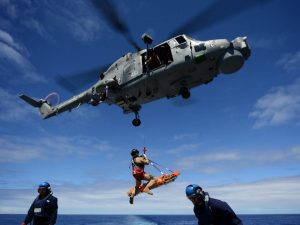The Five Power Defense Arrangements (FPDA), a set of mutual security agreements dating back to 1971 between Australia, Malaysia, New Zealand, Singapore, and the United Kingdom, is very much alive and kicking as it approaches 50 next year. Termed the “durian pact” by Australian journalist Graeme Dobell – both due to its Southeast Asia focus as well as characteristics not immediately appreciated by the non-cognoscenti – the Cold War origins of the pact lay in the U.K.’s military withdrawal from Malaysia and Singapore, paving the need and the way for a multilateral security arrangement.
Adding to this, Dobell also point to Indonesia’s 1963-66 konfrontasi military campaign against Malaysia and Singapore, as well as Singapore’s expulsion from Malaysia’s Federation in 1965. Analysts like Tim Huxley have argued that by including both Malaysia and Singapore in the FPDA, it served to build “strategic confidence” between the two.
On November 27, the defense ministers of the FPDA issued a joint statement in which among other things they “reaffirmed their commitment to the FPDA’s founding principles: to remain relevant and defensive in nature, and evolve at a ‘pace comfortable to all’.” In fact, it is this attempt to stay relevant and grow organically despite political divergences between the members – three of them are U.S. allies and two are not, not the least because of their ASEAN membership and tightrope walk between China and the United States – is what makes the grouping curiously robust.
And part of this robustness has to do with an agenda that has also embraced counterterrorism, humanitarian assistance and disaster relief, and maritime security, along with maintaining primary focus on conventional deterrence, as the joint statement notes.
Speaking to The Diplomat, John Blaxland, a professor of international security and intelligence studies at the Australian National University, noted: “The FPDA has been the region’s quiet achiever, proving to be remarkably resilient, outlasting the end of the Cold War by more than three decades. What’s more, despite being an apparent hangover from a different era, the member states still see it having ongoing utility.” He added that “utility appears to have enduring features, contributing quietly but significantly to regional security and stability: the key ingredients for prosperity.”
The FPDA has both political as well as military mechanisms (see this article by Li Jie Sheng for a background) and holds the annual Exercise Bersama Lima. This year’s edition of the exercise has been cancelled due to the ongoing COVID-19 pandemic. Air defense forms a crucial part of the FPDA.
Some have pointed out the absence of a direct reference to China in the latest joint statement, but such an omission was to be expected, given the composition of the grouping and its “pace comfortable to all” approach. But beyond what a formal statement may or may not say – or who it may or may not name and shame – lies the question of what remains to be done going forward, substantively; and how to buy greater buy-in from other regional powers for it.
There are two trajectories that FPDA could take as it crosses the 50-year mark next year to address this question: either expand its membership to include others — perhaps even India could join in, as C. Raja Mohan has suggested — or focus more clearly on grey-zone threats, such as challenges from illegal fishing and maritime militia. (Already, Malaysia’s recent robust stance on illegal fishing sets a serious example that the grouping could build on.) Both will enable powerful defensive checks on China’s ambitions even though the grouping continues to eschew naming any specific target for its activities.
At any rate, the future for the FPDA is secure. As Blaxland said, “Even Indonesia now sees it as a relatively good thing, contributing observers to its many activities. At this rate, and in due course, our children may well end up celebrating its centenary.”

































